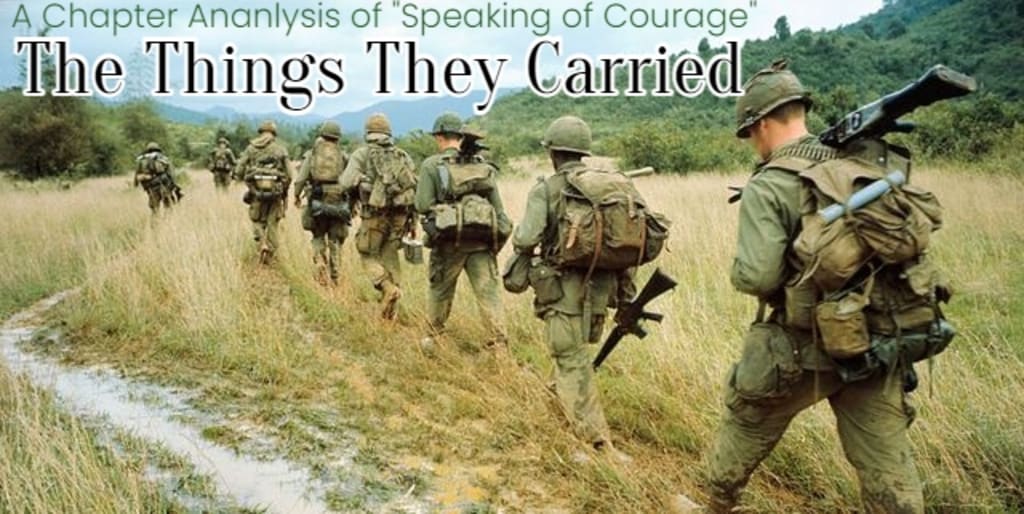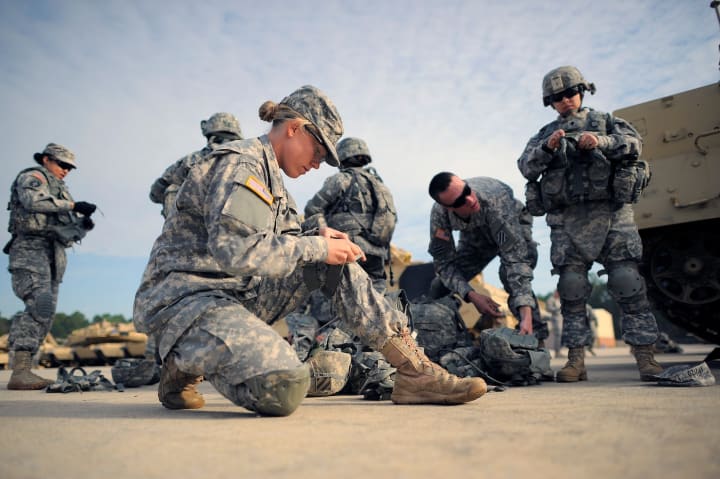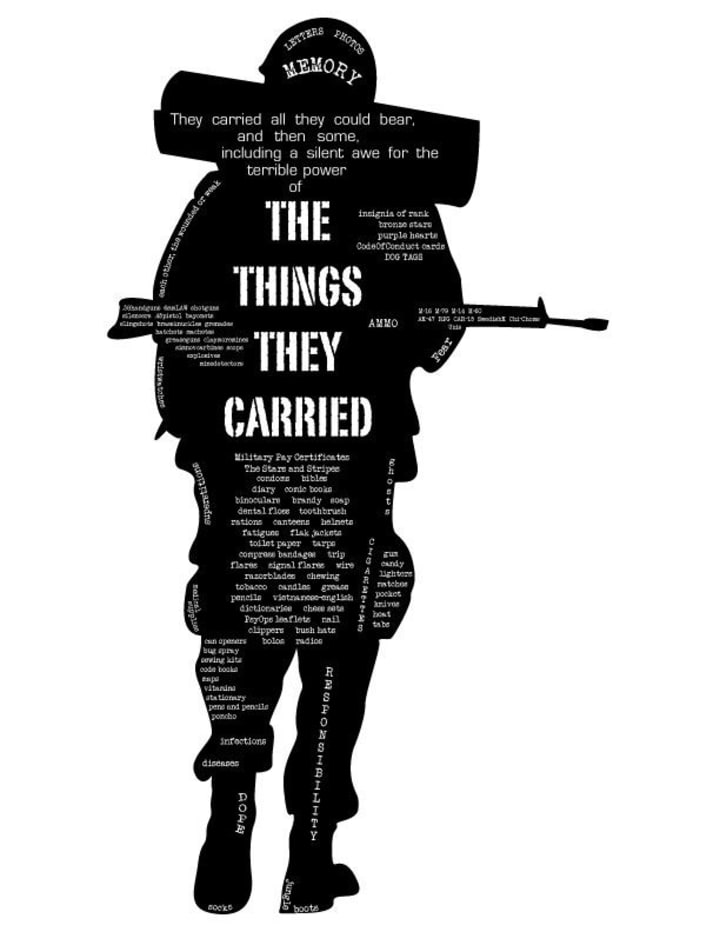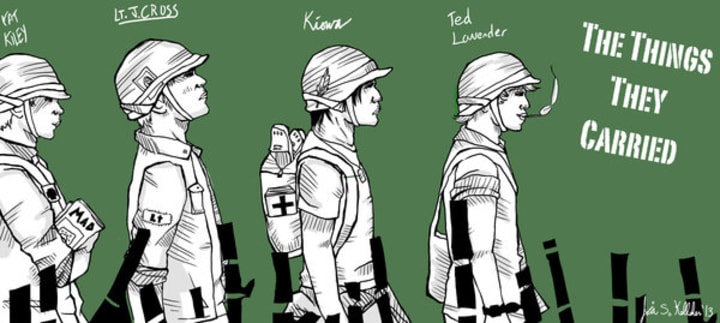
Based on a psychological understanding of the chapter “Speaking of Courage” from the novel The Things They Carried written by Tim O’Brien, the trauma that’s developed through being in the war starts to affect a soldier’s psyche during the war and continues to do so afterward.
Speaking of Courage is a chapter about a man named Norman Bowker and how he’s dealing with his life after the war. “The war was over and there was nowhere in particular to go(O’Brien 131).” The way Norman sees it, the war is over and he has nothing. The war took his future. It made him become something other than what he was, and for a long time that’s all he was- a soldier. Now he can’t seem to make the shift back into ‘regular everyday citizen’.
“Then he started all over again, driving slowly, feeling safe inside his father’s old Chevy(O’Brien 131).” Norman is dealing with the after effects of the war, which have left him with a mental condition known as PTSD. Norman finds a comfort in the repetitiveness in driving, and he feels safe in the car, which is how he tries to cope with the trauma he’s experienced in the war.

PTSD (Post Traumatic Stress Disorder) is a mental health condition that's triggered by a terrifying event — either experiencing it or witnessing it (PTSD). PTSD symptoms include : flashbacks, negative changes in beliefs and feelings, hyper-arousal, nightmares, intrusive thoughts, severe anxiety, and survival guilt. A lot of soldiers with PTSD also spend a large amount of time avoiding situations that could trigger an episode.
What sets Vietnam Veterans apart from others- as far as trauma is concerned- is the constant violence that surrounded them; gruesome injuries, comrades falling left and right, and being in the constant danger of an ambush. One of the many problems with PTSD is the depression and anxiety these people face. A recent study found that among OIF/OEF Veterans, those with subthreshold PTSD were 3 times more likely to report hopelessness or suicidal ideation than those without PTSD (PTSD: National Center for PTSD.) “Want to hear a war story?(O’Brien 138)”
The shit field is a specific memory that stuck with him. He let his friend Kiowa sink into the mud and die so he could save himself, and he regrets it every day. He wants to talk to someone about it, but he’s ashamed of what he did, and perhaps ashamed to admitting he’s not dealing well mentally. Back then a lot of mental diseases were swept under the rug, people were told not to talk about it. Even now, things like depression and anxiety are sort of hush hush. People who notice assume it’s none of their business when they do notice it, and that’s how people like Norman Bowker end up hanging themselves in a YMCA locker room.

Not everyone who enters the war comes back with PTSD. Some simply need to get help to cope with the trauma of everything that’s happened around them. It becomes PTSD when a victim’s symptoms increase in severity or lasts for months or even years after the war. The trauma theory says that victims find no sense of safety in the world, they have feelings of invasion, defilement, loss of control, humiliation, and self doubt. These victims often have intense but unstable relationships.
“The rain never stopped (O’Brien 141).” Once again, this is a line you hear over and over again in this chapter. It really drills into you how difficult it was for Norman Bowker to hold onto Kiowa’s foot, and how much this event affected Norman’s psyche. Near the end of the chapter, Norman almost talks to some stranger about it, someone who is willing to listen, but he decides not to. He stops at a picnic shelter called Sunset Park.

He gets out of the car and walks down to the lake, where he slowly waded his way in without taking any of his clothes off- not even his shoes. “He put his head under, opened his lips, then he stood up(O’Brien 198).” The fact that he left his clothes on suggests that he had thought about not coming out of the water, that he was going to drown himself.
Research looking specifically at combat-related PTSD in Vietnam era Veterans suggests that the most significant predictor of both suicide attempts and preoccupation with suicide is combat-related guilt (PTSD: National Center For PTSD). It’s very possible and probably accurate that Norman Bowker has a “it should've been me” attitude about Kiowa’s death, and that’s why he was in the lake. He thought about drowning, but after a little while, got out, deciding against it- for now.
From the moment he let go of Kiowa’s boot, something began to change Norman Bowker. The trauma from this event and many others like it have put him into a constant state of fight or flight. He has a lot of guilt about letting Kiowa slip away, and because of the war and the things he’s seen, he has PTSD, and no way to deal with it. Looking through a psychological lens of “Speaking of Courage,” the trauma that’s developed through being in the war starts to affect a soldier’s psyche during the war, and continues to do so afterwards.

citation page
O'Brien, Tim. The Things They Carried: A Work of Fiction. New York: Broadway, 1998. Print.”
"(PTSD)." - Mayo Clinic. N.p., 2015. Web. 30 Nov. 2015.
"PTSD: National Center for PTSD." Relationship Between PTSD & Suicide. N.p., n.d. Web. 30 Nov. 2015.
About the Creator
QuirkyMin
Aspiring writer, sharing articles of personal interest as well as original short stories.
https://linktr.ee/quirky.min






Comments
There are no comments for this story
Be the first to respond and start the conversation.